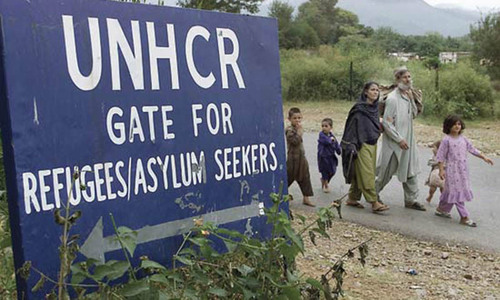How would Pakistan treat Syria’s refugees?

It is convenient to scold the Western nations for their racist antipathy towards the incoming refugees, when the refugees aren’t Afghan, and the territory they’re coming to, isn’t ours.
In the past few decades since Pakistan opened its doors to refugees pouring in across our Western border, our country has emerged as one of the largest refugee host nations in the world; a fact that isn’t looked upon as often with pride, as it is with regret and contempt.
The devastating APS attack was, in a certain way, to the Afghan-Pakistani community, what 9/11 was to Muslims in the United States.
It changed things for thousands of families that had nothing to do with militancy, yet were forced to prove their innocence and loyalty every day under the threat of “repatriation”.
Also read: ‘Maltreatment of Afghans peaked post-APS attack’
In the month after the Peshawar attack, the number of refugees being forced back to Afghanistan spiked by a factor of nine. Furthermore, since the introduction of the National Action Plan (NAP), there has been an unprecedented increase of ‘spontaneous returns’ of refugees.
The Human Rights Watch (HRW), has confirmed that many of these refugees were coerced out of Pakistan by the authorities.

Testimonies obtained from ordinary Afghan vendors about police brutality and racial profiling, are harrowingly antithetical to the Ministry of States and Regions (Safron) claim that it seeks to “maintain its traditional hospitality”.
Afghan refugees, and Pakhtun people in general, represent a universally betrayed class of people in Pakistan.
Even among the more inclusive liberal circles, it is frightfully common to have people discussing over tea and cake-rusk, how Afghan refugees are stealing our jobs, bringing drugs into our country, and assisting in terrorist operations, supposedly in the ample free time they have between selling corn and homemade goods on the roadside to make ends meet.
Also read: Evicting the homeless, keeping Islamabad beautiful?
Those who follow Western politics, should immediately recognise the similarity of such rhetoric with that spewed by right-wing parties in Europe and the US.
Consider the constant, racist fear of ‘illegal Mexican immigrants’ bringing drugs into America, and taking jobs away from American people. The very insinuation causes outrage among those who stand for liberal principles, particularly that there is no such thing as an “illegal human”.
Since the Paris attack, social media has been awash with Pakistani users, among others, pleading European nations not to turn their backs on Syrian refugees for ‘security reasons’.
We cheered France’s confirmation that it would accept 30,000 refugees, regardless of what happened in Paris.
The mildest attempt at blaming the Muslim community for the brazen assault, is met with fierce backlash by the unified army of world’s liberals, particularly Muslims living in Europe who are fully aware of what this sentiment has the potential to lead to.
Why was this same magnanimity not an option when Afghan families were being repelled in droves, because Pakistanis had almost unanimously decided that their ethnicity makes them a ‘security risk’?
Why was the authorities’ brutality against them ignored or even celebrated as an essential ‘push factor’?
In fact, it is rather idealistic to expect empathy for foreign elements, when we had a difficult time extending basic human courtesies to our own IDPs.
Over a million predominantly-Pakhtun citizens displaced by the escalation of the counterterrorist operations were urged to remain confined in camps, not just by many conservatives, but Pakistan’s liberal torchbearers as well.

This is despite the fact that there’s a perfectly tribal reason for us to care about Afghan refugees. We cite ‘Muslim brotherhood’ while banging away at our keyboards in solidarity with people of Gaza, Rakhine or Kashmir, but make no attempt at checking our ethnic biases when Afghan women and children come knocking at our door.
Also read: How many refugees does it take to care?
From the refugee crisis in Europe to the marginalisation of racial and religious minorities in America, we’ve been offered many opportunities to learn from the developed world’s egregious mistakes.
Instead we decide to use these errors as nothing more than sustenance for our own smug nationalism, and ammo against all that is allegedly ‘Western’.
‘Racism’ isn’t an exotic affair between white and black people in a land far away.
Racism is what we do to the Afghan immigrants’ right here in Pakistan. And, it is time we acknowledged that.

Faraz Talat is a doctor from Rawalpindi who writes mostly about science and prevalent social issues.
He tweets @FarazTalat















































